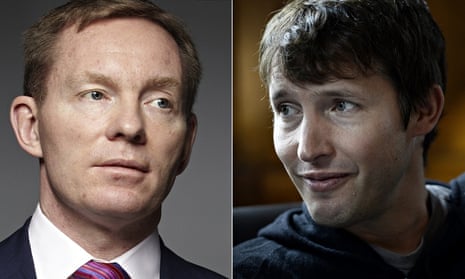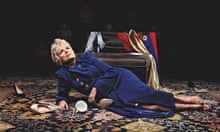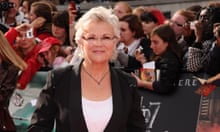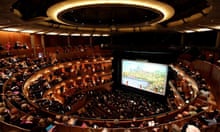The singer James Blunt has branded Chris Bryant a “classist gimp” after the shadow culture minister complained that the arts were too dominated by people from privileged backgrounds. In response, Bryant said the singer was being too “blooming precious”.
The row broke out after Bryant cited the well-spoken singer as an example of a performer who had benefited from a wealthy upbringing. “I am delighted that Eddie Redmayne won [a Golden Globe for best actor], but we can’t just have a culture dominated by Eddie Redmayne and James Blunt and their ilk,” the Labour MP told the Guardian on Friday. “Where are the Albert Finneys and the Glenda Jacksons? They came through a meritocratic system.”
On Monday, Blunt fired off a letter to Bryant arguing that his private education and background had in fact worked against his success in the British music industry, where he was thought to be “too posh”. In the forthright message, Blunt accused the Labour MP of being a “prejudiced wazzock” teaching the politics of jealousy, rather than celebrating success in similar fashion to the US, where the singer got his first big break.
The letter began: “Dear Chris Bryant MP, You classist gimp. I happened to go to a boarding school. No one helped me at boarding school to get into the music business.”
Blunt argued that it was Bryant’s “populist, envy-based, vote-hunting ideas which make our country crap, far more than me and my shit songs, and my plummy accent”.
He then made the case that the only way his public school had given him a head start was by teaching him to aim high. “Perhaps it protected me from your kind of narrow-minded, self-defeating, lead-us-to-a-dead-end, remove-the-‘G’-from-‘GB’ thinking, which is to look at others’ success and say: ‘It’s not fair’,” he wrote.
Blunt, who attended Harrow school in west London, initially joked on Twitter about the idea that he was dominating the arts, saying: “Really? I thought we’d got rid of me years ago.”
Bryant responded with his own letter, stressing that he was not knocking the success of either Blunt, whose album he said he had bought, or Redmayne, whom he admired as Richard II. “If you’d read the whole of my interview, you’d have seen that I make the point that the people who subsidise the arts the most are artists themselves,” he said. “Of course that includes you. But it is a statement of the blindingly obvious that that is far tougher if you come from a poor family where you have to hand over your holiday earnings to help pay the family bills.”
He added: “I’m delighted you’ve done well for yourself. But it is really tough forging a career in the arts if you can’t afford the enormous fees for drama school, if you don’t know anybody who can give you a leg-up, if your parents can’t subsidise you for a few years whilst you make your name, and if you can’t afford to take on an unpaid internship.
“You see, the thing is, I want everyone to take part in the arts. I don’t want any no-go areas for young people from less privileged backgrounds. And I’m convinced that we won’t be Great Britain if we waste great British talent in the arts. You seem to think talent will always out. My fear is that someone like Stanley Baker, the son of a disabled miner in the Rhondda, who rose to be one of Britain’s greatest film actors (Zulu), would have found it even harder to make it today.”
The Labour politician is not the only person to have called on the arts world to do more to increase diversity. The actor David Morrissey has said that young working-class people are being priced out of the profession and argued that the creative industries should do more to end their “economic exclusion”.
“Television is doing very well for itself, but the trickle-down effect isn’t working,” he told the Radio Times. “We’re creating an intern culture – it’s happening in journalism and politics as well – and we have to be very careful because the fight is not going to be there for people from more disadvantaged backgrounds.”
The actor Dame Judi Dench has also said that financial obstacles to training have made the profession more elitist.











Comments (…)
Sign in or create your Guardian account to join the discussion